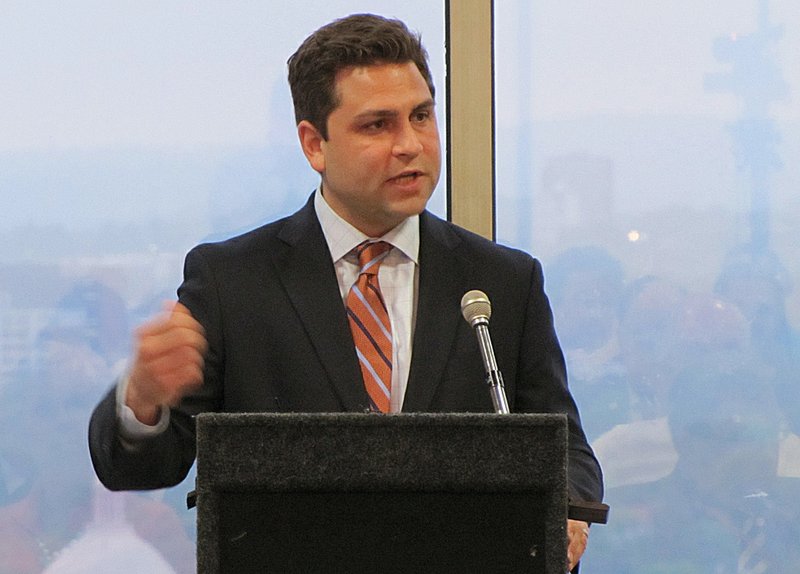Senate President Jonathan Dismang said Tuesday that lawmakers had a successful legislative session despite controversy surrounding a religious-freedom bill that overshadowed some earlier accomplishments.
Dismang, R-Beebe, spoke Tuesday morning to the Political Animals Club, reviewing the legislative session that ended last week and touching on the contentious religious-freedom bills.
One such measure, House Bill 1228, made its way to Gov. Asa Hutchinson's desk before Hutchinson, who had expressed support for it, asked lawmakers to instead pass legislation that was more closely aligned with the federal Religious Freedom Restoration Act signed into law by President Bill Clinton in 1993.
Lawmakers fulfilled that request, passing Senate Bill 975 and recalling HB1228 on the session's final day.
Dismang said Tuesday that HB1228 was not expected to advance from committee on the Senate side, but it unexpectedly did. As it made its way through the chambers and onto the governor's desk, protesters gathered at the state Capitol and some politicians, groups and businesses — including Apple and Wal-Mart — expressed disapproval and urged Hutchinson to veto it.
"I think ultimately we got where we wanted to be," Dismang said. "The process was not pretty. But again the ultimate result was good. We wanted a [Religious Freedom Restoration Act], obviously the majority of both chambers wanted to have some of those protections in place that had been given to us at the federal level."
In Indiana, where controversy grew out of a similar bill that was signed into law, legislators went back and added language that said the law cannot be used to discriminate on the basis of sexual orientation or gender identity.
No such provision was added to the Arkansas law Hutchinson ultimately signed. Dismang said afterward that he didn't know whether he would support a law that would provide civil-rights protections to gay people, saying he would want more details about the prospect before deciding.
During his talk to several dozen members of the political club at its breakfast meeting at the Little Rock Club in downtown Little Rock, Dismang highlighted what he called the biggest achievements of the session. Among them, he pointed to bills extending the private option through the end of next year and creating a task force to consider the state's healthcare system into the future; making reforms to the prison and parole system; creating programs aimed at improving workforce training across the state; and cutting income taxes for middle-class earners.
He said the controversy surrounding the religious-freedom bills at the session's end had drawn attention away from some of those earlier bills, but he said they stand as positive achievements for the state.
"I think we got a lot of success in this session," he said. "I think it's something the people of Arkansas can be proud of."
— Gavin Lesnick
EARLIER:
LITTLE ROCK — Arkansas' Senate president said Tuesday that he didn't like the process that surrounded the last-minute revamping of a religious objections measure that initially was criticized as anti-gay, but said he was happy with the compromise version that was enacted.
Senate President Jonathan Dismang told members of the Political Animals Club that he shares some of the blame over the measure, which was revised after facing widespread complaints from critics that included the state's largest employers. Dismang said he had believed the initial version of the bill mirrored federal law, but hadn't read the measure.
Dismang said he thinks the initial version of the bill left too much uncertainty.
Gov. Asa Hutchinson on Thursday signed the compromise measure into law, a day after he called for the bill to be reworked.
— Andrew DeMillo, The Associated Press
Document set
Religious Freedom Restoration Act
Reader poll
Are you satisfied with Arkansas' amended religious-protection law?
- Yes; it protects everyone sufficiently.
- No; it still needs a nondiscrimination clause.
- No; a state religious-protection law isn't necessary.
- This bill was unnecessary because House Bill 1228 was preferable.
- Other (please comment)
1150 total votes.

